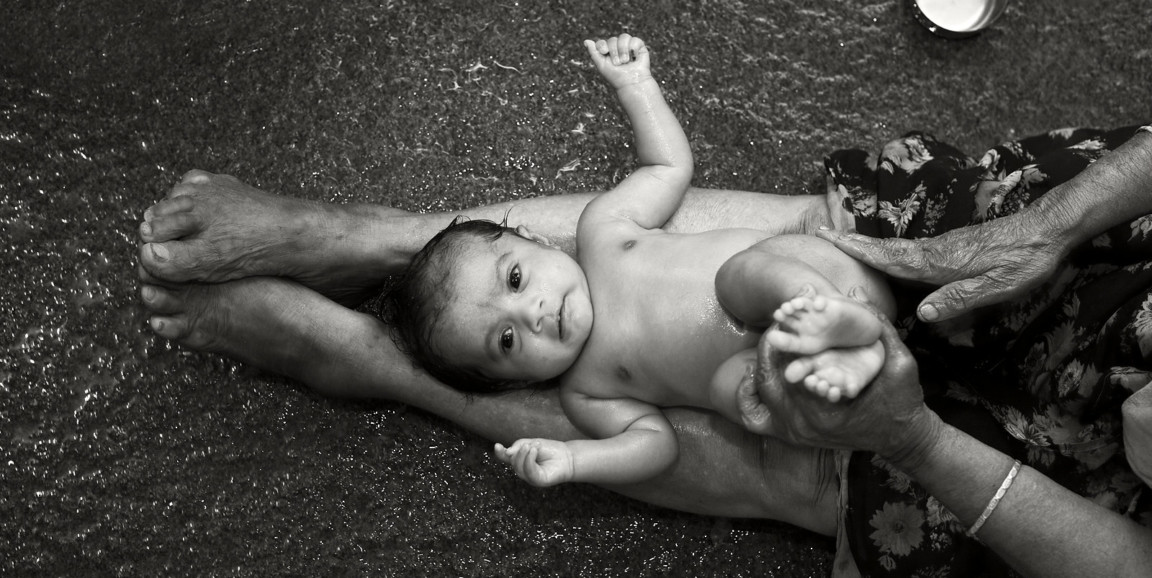Changing infant care to improve newborns' health in India - Scope

Changing infant care to improve newborns' health in India
Around 30 years ago, a team of public health researchers made trips through northern India and Bangladesh to investigate how families in rural villages cared for new babies.
"We saw that mothers and grandmothers were spending a lot of time applying oils onto the skin of newborns," said Gary Darmstadt, MD, now a global health expert at Stanford Medicine. A few times each day, family members were vigorously rubbing infants' skin with mustard oil, sometimes mixed with grains and herbs into an abrasive paste called bukwa. The centuries-old practice, believed to purify the baby after birth and strengthen its constitution, was used almost universally through all strata of society in the Indian subcontinent.
Were there benefits of this type of infant massage that were unrecognized by Western science?
"Our initial reaction was 'There's got to be something to this,'" Darmstadt said. But while there were pros of the infant massage, Darmstadt and his team also found cons with the practice -- namely that it could be too abrasive for newborns' delicate skin and the oil could contain toxic fatty acids and contaminants.
This inspired the team to tweak the technique in ways that might boost infant survival and growth. The goal wasn't to halt the practice that has been passed on for generations, but rather adapt it and imbue the oily concoction with nurturing benefits. Their solution: sunflower oil.
Two new papers published recently in PLOS Medicine and the American Journal of Clinical Nutrition describe a large, community-based trial in India that tested the alternative massage oil identified by Darmstadt and others. The team included researchers from Stanford Medicine; UC San Francisco; Lucknow University in India; and Indian government and community partners, led by the Community Empowerment Lab, an NGO in rural villages in Uttar Pradesh, India, with particular expertise in behavior change management for maternal and newborn health. The trial, which involved more than 26,000 newborns, showed that sunflower seed oil has advantages for babies' survival, health and weight gain.
Lab research pointed the way
Early in the course of their research, the team conducted lab studies in animal models, finding that traditional massage practices could damage skin and pose risks to overall health.
"Mustard oil appeared to harm the skin barrier," Darmstadt said.
Newborns' skin is fragile, especially among babies born prematurely. Skin damage creates risk for infection and increases moisture and heat loss -- all dangerous for tiny infants.
The team saw evidence of damage to keratinocytes, the skin's most prevalent cell type, possibly from a pro-inflammatory fatty acid in mustard oil. When bukwa was used for infant massage, its abrasive qualities could also cause mechanical damage to the skin.
Once they discovered the properties of massage oil that are beneficial for the skin barrier -- including a particular essential fatty acid called linoleic acid that the human body cannot make itself -- researchers demonstrated that use of the newly concocted oil in hospitalized premature babies led to fewer bloodstream infections and a lower neonatal mortality rate compared to babies who did not receive any skin emollient. They decided to test whether the oil had similar benefits in a community setting among babies cared for in the hospital after birth and at home.
The study took place from November 2014 to October 2016 across hundreds of villages in rural Uttar Pradesh, India. Each village was assigned to a treatment arm: 138 villages used sunflower oil, while another 138 villages were assigned to the comparison group, which used traditional ingredients, including mustard oil and sometimes bukwa.
Researchers visited pregnant women in all the villages at the 25th week of pregnancy and on the baby's 1st, 7th and 29th days after birth to collect data, including health data for the baby, demographic information and reports of massage practices. Women in the intervention group also received sunflower oil and instructions for how to massage their baby, including handwashing.
They were asked to avoid using mustard oil or bukwa, at least until after the baby was 28 days old, when their skin has had some time to toughen up. In the villages using sunflower oil, traditional masseuses, typically hired by families for some of their child's as well as the mother's massages, also participated in promoting use of the new oil and gentler application techniques.
The study included 13,478 babies in the intervention group and 13,109 babies in the comparison group. Families were then asked what oils they used and the research team calculated whether they exclusively used the form of oil assigned to their village: 4,096 infants in the intervention group exclusively used sunflower seed oil as intended and 4,720 infants in the comparison group exclusively used traditional mustard oil massage.
Real-world results
During the data collection, families in the intervention group reported being 78% more likely to wash their hands before performing infant massage and much less likely to use abrasive bukwa for massage than those in the comparison group.
When analyzing data from all the infants, the researchers found no difference in neonatal mortality rates between the intervention and comparison groups. But an analysis focused on the smallest infants -- with birth weights below 1,500 grams (about 3.3 lbs) -- found that the intervention group had a 52% lower neonatal mortality rate than the comparison group.
When comparing infants of all sizes and birth weights whose families closely followed their assigned treatment, neonatal mortality was 58% lower in those who used only sunflower oil than those using only mustard oil. This analysis was done to measure the potential benefit of following the protocol the way the researchers intended.
Babies also gained weight more quickly in the intervention group: Weight gain was about 1 g/kg/day faster when all participants were included in the analysis. The researchers saw an even larger advantage (1.3 g/kg/day) for infants that exclusively received the sunflower oil. Babies with birth weights below 1500 grams gained weight about 4.2 g/kg/day faster when massaged with sunflower oil. Over the neonatal period, this added up to about 2.7 ounces of additional weight gain in the sunflower oil treated infants.
Having a better skin barrier may promote growth because the infant is losing much less water and heat through the skin and spending less energy to stay warm, so those extra calories can be put toward growth.
In addition, rates of hospitalization and of any illness in the first month after birth were lower in babies whose families exclusively used sunflower oil, by 36% and 44% respectively, than those who used exclusively mustard oil.
The research team hopes their findings will draw attention to the importance of babies' skin health.
"We think, 'The lungs are important, the gut is important, the brain's important,' but we often forget that the skin is important too, especially in preterm babies," Darmstadt said. "The skin is a big factor in babies' wellbeing; data like this helps us understand why that is."
The study also demonstrated that changing health habits at a large scale can be difficult; the majority of families didn't follow study protocols perfectly, although a sizeable proportion did. However, the researchers were encouraged to see that, as the study progressed, more families followed the protocols.
Now, the team is focused on gaining insight into how to account for social and behavioral decisions that affect how families care for their newborns' skin and on combining that knowledge with their discoveries, Darmstadt said.
"That's a lot of the fun, trying to translate the science to real-life impact," he said.
Photo by Rajith Kalluraya
Popular posts

Stanford Medicine students find their match


Comments
Post a Comment